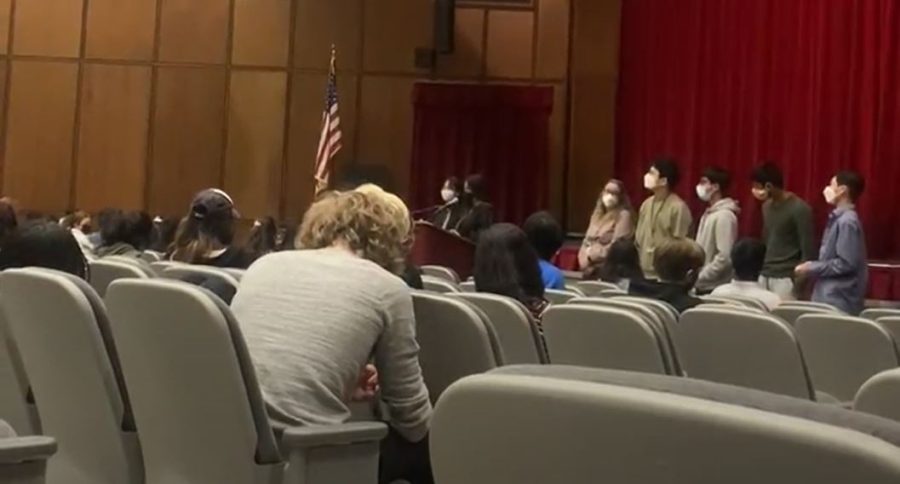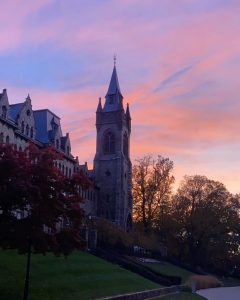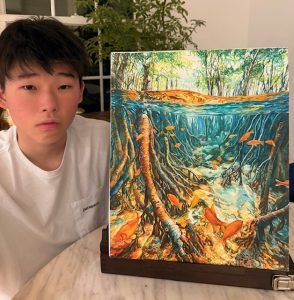A Fresh Freshman Class Council
March 24, 2022
On Wednesday, February 2, 2022, voting for the Class of 2025 Class Council officially opened. For weeks before the voting, candidates campaigned by hanging up colorful posters, creating videos and presentations with their resume, their plans for class council, and secret skills.
Class Council, also known as ClassCo, is a group of students who represent their respective grades. ClassCo members plan initiatives such as class merchandise, semi-formals, and other social events.
The 2025 ClassCo election was much more chaotic than expected, especially compared to the elections for other grades that happened earlier this year. With a total of 85 students running for office, the election determined the class president, vice president, secretary, treasurer, promotions director, historian, and one representative for each academy. All of the candidates were excited to see changes in the curriculum, how administration communicates with students, and other grade-specific issues.
“They’re certainly a lot more dedicated than my grade was,” commented Januka Gunadasa, an AMST sophomore and the 2024 ClassCo treasurer. “All I saw during the election were posters everywhere. For 2024 ClassCo, we only wrote position papers, and there were only 20 candidates total.”
The Academy Chronicle conducted a survey on what BCA freshmen thought about the election. The competition for each position was intense. For example, there were nine candidates running for vice president. The elections for academy representatives were smaller, with generally 5-7 candidates each.
According to the survey, candidates put a lot of thought into which position they chose to run for before signing up. 76% of respondents reported that they truly believed their qualifications matched with the responsibilities of the position. 64% of respondents also indicated that the position they chose best corresponded to the changes they wanted to see being made at BCA in the future.
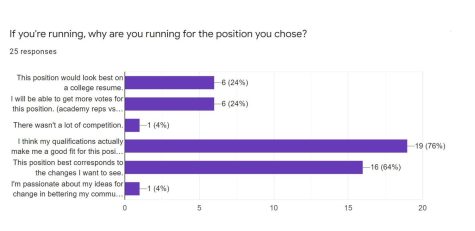
“I ran because I love being a leader and being involved with my school. I felt that I have the experience necessary to be a good vice president,” said Nidhi Karnik, an ABF freshman who ran for Vice President. She went on to elaborate on how she thinks that an important part of being in ClassCo is being open to meeting new students. “I feel like I had made a connection with a lot of BCA students over the past semester and that’s what made me such a good fit for this position.”
When voters were asked about what trait they valued most in a candidate, the ability to take initiative and be a good leader was most popular, with just over half the votes. Being smart and helpful was a trait prioritized by 7 students, and 6 students valued compassion. Of course, different positions require different strengths. For example, the secretary needs to be communicative and organized to take detailed notes during ClassCo meetings to share with the student body, while the treasurer needs to have experience managing finances to plan fundraisers and budget successfully.
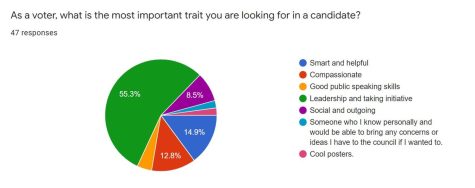
All of the candidates had impressive accomplishments, ranging from being actively involved in student council in middle school to winning various awards. However, these accomplishments were not the main criteria for many voters. For many, the election was more of a popularity contest than a competition between campaigns.
Most of the time when a new candidate came up in conversation, the question running through people’s minds was not “What are their ideas?” but instead, “How many people do they know?”
While elections were a fun experience, students felt a lot of negative pressure from their friends and from seeing the same campaigns repeated over and over again on social media. “It is a competition to see who can get the most likes and recognition, not about the ideas,” said Jacob Berger, an ATCS freshman. Students were asked how pressured they felt to vote for their friends on a scale of 1-10 and 72% of respondents answered from 6-10.
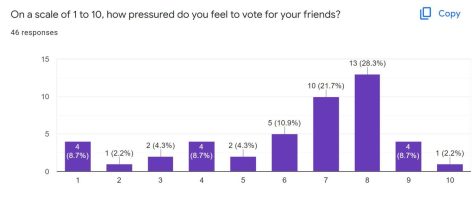
Another form of pressure is group campaigning. Group campaigning involves candidates for different positions working together as a team, which makes it easier to understand what multiple campaigns with similar goals stand for. However, 52.1% of survey respondents said they did not like group campaigning because they felt pressured to vote for groups instead of individual candidates.
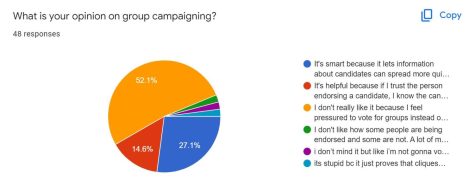
For Eesha Oza, an AMST freshman who ran for treasurer, there was an appeal to group campaigning as it helped candidates meet more students and reach more people, but she does not support it. “Especially in large groups, I feel like it pressures people to vote for everyone in the group instead of actually evaluating people’s individual qualifications.”
Tarini Kanapuram, an AEDT freshman who also ran for VP, added, “Group campaigning defeats the purpose of individual accomplishments.”
Since there were so many candidates, talk about campaigning was everywhere and very hard to avoid. Some sources of information were more popular than others. While discussion posts on Schoology were the official school platforms for campaigning, and Outlook was for class advisers to officially send out information, 43.8% of students report that they received most of their election updates from Discord, which has organized grade-wide servers and more specific group chats. 25% of students said they get their information just by word of mouth.
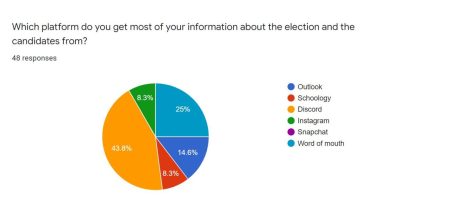
Adding the extreme competition to an already difficult election, most candidates moved past just submitting the required position papers and did as much as they could to stand out from other candidates. Popular campaigning strategies included posting eye catching slideshows and short videos on platforms such as Instagram, Snapchat, and Discord. Over the days leading up to the election, some students also passed out candy to spread the word about their campaign. According to the survey, passing out candy or flyers and putting up posters around the school were the most effective campaigning strategy.
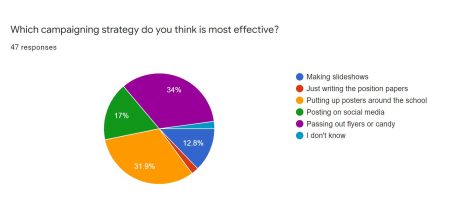
Posters also seemed to be the most likely to grab a voter’s attention. 91.7% of surveyed students reported that they had seen posters around the school, but only 60.4% of students said they skimmed some of the position papers and 58.3% said they looked at a few slideshows.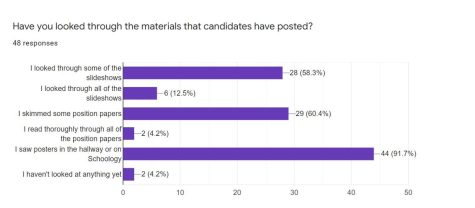
“I think making videos, creating catchy slogans, and other more creative campaigning techniques are most effective,” explained Nidhi. “Those were the things that helped people remember the candidate, instead of generic campaign material like position papers.”
On the other hand, there are also many reasons why students did not run. Those students noted that not only were the election results mostly based on how many people a candidate knew, running also took time and effort. Needless to say, for all of the positions, candidates needed to be able to work collaboratively, take initiative, and be strong communicators.
Students who didn’t run for ClassCo were asked why they chose not to. 46% of students reported that not knowing enough people was a part of their decision and 36% of students said they weren’t good public speakers or had a lot going on already.
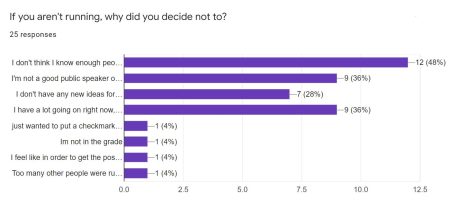
After more than two weeks of campaigning, voting finally opened on Tuesday, February 2nd and the class of 2025 couldn’t wait for results! The hard work, creativity, and dedication of all the candidates showed through in Tuesday’s speeches. Now, the freshman class has an amazing group of students representing its ideas and concerns.
Kai Kim, a candidate for AAST Rep, was excited to see the results of the election. “All of the candidates were great. They all had good ideas that I wouldn’t even think of but I’m sure the student body can appreciate. I can’t wait to see those ideas implemented.”
Great job to all the candidates who ran and good luck to the newly elected 2025 ClassCo members!

